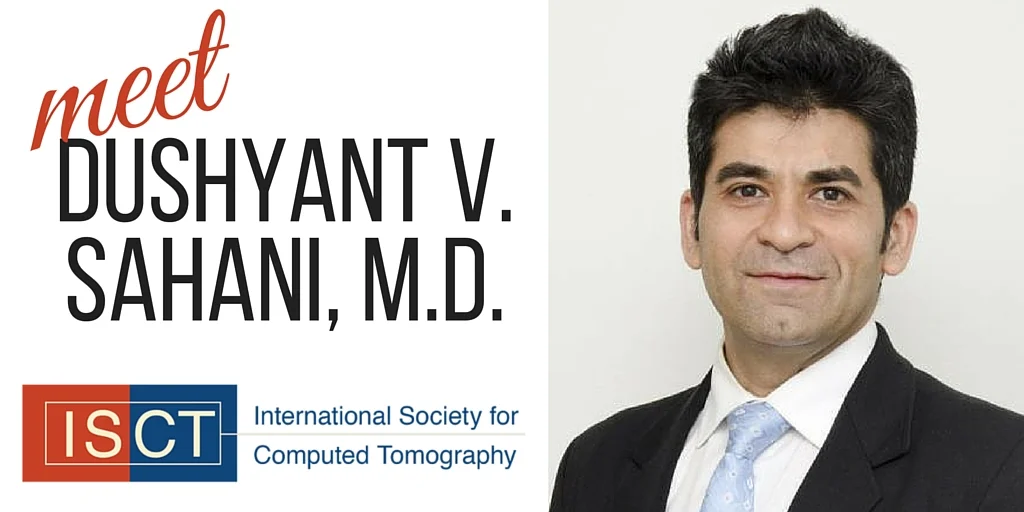Faculty Spotlight: Dushyant V. Sahani, M.D.
This week, we had the opportunity to interview Dr. Dushyant V. Sahani, who is Associate Professor of Radiology at Harvard Medical School, and Director of Computed Tomography at Massachusetts General Hospital, in Boston, Massachusetts. He will be leading our Computed Tomography course, Dual Energy CT Pre-Conference Workshop. Dr. Sahani has been involved with the ISCT computed tomography meeting since 2007, and we are excited and fortunate in having him play a major role at our meeting.
In our interview, Dr. Sahani shared why he was initially drawn to the CT meeting almost ten years ago. He stated, the ISCT meeting, was one of the best CT meetings he had ever attended, due to the modality focus, meeting format and diversity of the topics covered, as well asthe world-renowned faculty who have lead our talks. He indicated, gaining access to practical applications, combined with the insight into disruptive technologies and new industry innovations, made it impossible for him to imagine any other computed tomography meeting that went as in-depth as ISCT.
CT technology has evolved rapidly over the course of its 50-year history. The conundrum, however, has been technology quickly outpacing many radiology experts own understanding of the modality, resulting in disconnect between how people purchase CT technology and how they utilize it. Consequently, the ISCT came to realize that we needed to educate people on how to optimize different technologies and applications. Dr. Sahani likened this scenario to giving someone the most up-to-date iPhone, with a variety of functionality, but the user utilizing, to make phone calls only.
Dr. Sahani went on to say; he feels CT is taken for granted, because of relative ease of use and how quickly it has evolved. Innovations in CT generated new opportunities for clinical applications, not possible in the past. The bar for the standard of care has been raised both due the incremental and disruptive impact of routinely using advanced CT technology for many important clinical applications.
These applications have begun to replace invasive procedures such as, catheter angiographies, endoscopies including unnecessary surgeries and procedures, helping to lower overall costs for patients and providers alike. “Of course, these CT applications do pose few challenges with workflow and patient safety, but the ISCT faculty has done extensive research and have the clinical expertise necessary to make scanners safer for all,” said Dr. Sahani.
This year, we are pleased to have Dr. Sahani organizing and leading our pre-conference workshop on Dual Energy CT. This new technology can improve diagnoses and create opportunities for new imaging approaches in tissue catheter and quantifications.
There is a tremendous demand for Dual Energy technology, both domestically and around the world. However, most practices and users are confronting with the arduous task of effective application and adoption of DECT in the clinical realm without disrupting the CT workflow. Dr. Sahani’s workshop presenters have extensive clinical and research experience to discuss many diverse topics related to Dual Energy CT. The friendly, interactive format will explore clinical applications and cover all available technology options that are commercially available. “I am not aware of any other workshop in the world like this,” Dr. Sahani said, focusing on the unique opportunity attendees will have to interface directly with faculty and top computed tomography vendors.
“Not all DECT technologies are created equal, but they all have taken their own unique approaches for DECT; that’s why this kind of forum is important. We don’t favor any vendors over others, we perform research with the diverse DECT technology necessary to uncover each option’s benefits,” said Dr. Sahani. “When franchises like McDonald’s sell a new franchise location, the same equipment is provided to the purchaser, creating consistency, but with medicine it’s not like that. “Each patient is unique and the clinical expectations are in evolution with increasing demand for customization. Not every vendor can provide that same level of service for all DECT applications,” Dr. Sahani stated. He went on to say, Massachusetts General Hospital has 21 CT scanners and each scanner gives their radiology team a unique perspective and the ability to compare and provide clinical and technical expertise.
In his CT course, Dr. Sahani will also discuss how Iterative Reconstruction softwares from various CT vendors can be applied to improve image quality, at substantially reduced radiation dose. “These softwares are expensive, therefore it’s so important to know how to apply these on diverse equipment. He will share insights on how to match image quality as closely as possible without making it harder on technologists.

